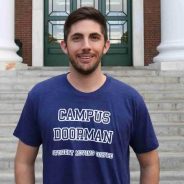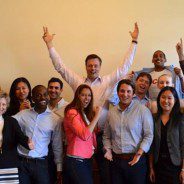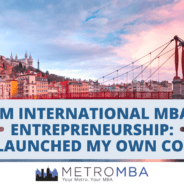Search results for startup lessons:
Startup Lessons: LA MILLA
The path for startups can be treacherous. In the series “Startup Lessons,” we examine new MBA startups at the ground level to understand how they succeed.
The sustainability adage, often enough, can feel like empty marketing. Consumers want environmentally conscious products, but tracking a company’s real to commitment to that goal can often be difficult. There are, however, a handful of company’s that fulfill that ambition well, like LA MILLA.
Milan-based company LA MILLA, founded by Poland-born Natalia Kalali, is a highly environmentally-conscious fashion retailer, with products made exclusively from Global Organic Textile Standard certified cotton and is completely absent of plastic. In addition, the company has partnered with Eden Reforestation Projects, a California-based NGO, which helps plant five trees for every LA MILLA item sold.
Kalali’s vision, along with the litany of jobs she’s helped cultivate in Italy, partially stems from her MBA education at MIP Politecnico di Milano. “[The] MBA at MIP Politecnico di Milano gave me a very good base and understanding of business in general,” she tells MetroMBA. “Moreover, during my studies, as part of the coursework, I had an opportunity to work on a start-up. It was the Project Work assignment and my first start-up experience.”

“MIP Politecnico di Milano has a very good reputation and is well classified in the diverse rankings,” she continues. “What convinced me towards MIP the most was their diverse academic program and an opportunity to work directly with some companies already during the MBA program.”
The Milan school is currently 96th overall in the most recent Financial Times Global MBA ranking, but enjoys top 10 individual rankings by the publication both in “international experience” (10th) and “international faculty” (3rd). That wealth of internationality helped cultivate Kalali’s company.
“I met many people from the business world, which made a great impact on my career, by giving me the opportunity to learn from them, and get more exposure to the actual inside of the world of business,” she says. “Not only academic staff, but also MBA colleagues—everybody with different backgrounds and origin. It was truly a very international and multicultural environment.”
“LA MILLA would not exist today if not my international experience and what I have learned by working with people from different cultures and backgrounds. I strive to make LA MILLA an internationally recognized ECO brand for all ECO conscious women.“
However, LA MILLA was not simply born out of Kalali’s academic inspiration; it was also fear. According to the official company website, Kalali says “I was worried about my children’s future.”
Kalali, a mother of two, founded LA MILLA after a particularly difficult transition. After years of maternity leave, she found companies weren’t too eager to hire a young mother. Taking matters into her own hands and with climate degradation in mind, Kalali continued her education with the pursuit of several online courses based out of the U.S. and Canada. “The objective of one of those courses was to develop an app,” she writes. “Once enrolled I learned that I needed to develop my own business idea too. This was truly a groundbreaking moment for my career (…) It became clear to me, that my goal was to open my very own, eco-friendly company!”
As for the future of her company, Kalali believes the future of even more environmentally-conscious consumers will gravitate to LA MILLA, as ECO efforts become more important.
“In the world of internet and easy access to information, consumers are becoming smarter, more informed and aware of what is happening to our climate,” she says. “They are increasingly moving towards sustainable brands. I believe that LA MILLA is on the right path to deliver them the product and the brand that they are searching for.”
For more information, and to shop, head over to the official LA MILLA website.
Startup Lessons: The Food Mint
The path for startups can be treacherous. In our series “Startup Lessons,” we examine new MBA startups at the ground level to understand how they succeed.
Continue reading…
Startup Lessons: Impulse Analytics
The path for startups can be treacherous. In our series “Startup Lessons,” we examine new MBA startups at the ground level to understand how they succeed.
Startup Lessons: Campus Doorman
The path for startups can be treacherous. In the series “Startup Lessons,” we examine new MBA startups at the ground level to understand how they succeed.
Startup Lessons: ParkingBee
The path for startups can be treacherous. In the series “Startup Lessons,” we examine new MBA startups at the ground level to understand how they succeed.
UCLA Hosts Worldwide Alumni, Startups, and More – Los Angeles News
It’s Friday! Let’s dig into the most recent news coming out of the Los Angeles metro from the past week that isn’t about the Lakers or Dodgers.
Worldwide Welcome Weeks – UCLA Anderson
UCLA Anderson celebrates its annual ‘Worldwide Welcome Weeks’ this month with events designed to introduce new alumni to their regional chapters or affinity groups, and engage them with leaders and thinkers in their home cities.
Members gained valuable insight with behind the scenes tours of successful businesses along with more informal meet-ups with fellow graduates.
Here in the states, alumni networks gathered in such cities as San Diego, Irvine, Marina del Rey, Portland, and New York City for events ranging from a tour of Petco stadium to an exploration into the present and future of blockchain technology.
Internationally, students met in Madrid to discuss the future of sustainable strategies in business, and in Sydney and Shanghai for happy hours. Alumni in Vancouver got the chance to give back with a day of service at Quest Food Exchange.

For more on each regional event, including photos, please visit UCLA Anderson’s news page.
Life is a Startup – USC Marshall
Professor Noam Wasserman of the USC Marshall School of Business recently published his book, Life Is a Startup: What Founders Can Teach us About Making Choices and Managing Change, from Stanford University Press.
Wasserman’s previous book, The Founder’s Dilemmas: Anticipating and Avoiding the Pitfalls That Can Sink a Startup, landed at a number one spot on Amazon’s bestseller list in the management genre. Wasserman also received the Academy of Management’s Impact on Practice award.
Formerly a professor at Harvard Business School, Wasserman has over the course of his career studied founders of startups to discover not only their common characteristics, but also how their personal and creative lives evolved over the course of their careers.
In a recent profile with USC Marshall Wasserman poses the question, “How do we prevent our fear of failure from torpedoing our making life changes? How can we gain knowledge and motivation from our failures rather than having them stop us in our tracks?”
On the flip side are the perils of success. You reach your dream, and then all sorts of challenges are introduced. Your success has actually heightened a bunch of problems for you. Planning ahead for the perils of success is key to being able to have them be true successes.
Life is a Startup is Wasserman’s exploration of how lessons learned during the startup of successful ventures can be applied to life experiences as well, particularly in times of difficulty or change. You can read the rest of the USC Marshall profile of the author and professor here.
24th Annual Economic Forecast – Mihaylo College of Business and Economics
In partnership with the Orange County Business Council (OCBC) and U.S. Bank, the Mihaylo College of Business and Economics‘ Woods Center for Economic Analysis will host its 24th Annual Economic Forecast.
Examining the three-year outlook for Orange County, Southern California, and also the domestic and global economies, the forecast promises to deliver vital information from leading academic and business professionals in the region.
Home prices, the unemployment rate, the general outlook on current economic conditions for business managers will be among the topics of discussion. Opening talks will be given by Provost Emeritus Anil Puri, former dean of Mihaylo College, and Associate Professor of Economics Mira Farka, a former senior economist at Deutsche Bank.
Other speakers include Lucy Dunn, president and CEO of the OCBC and former director of the California Department of Housing and Community Development, and Michael Camuñez, president, CEO and co-founder of strategic consulting firm Monarch Global Strategies LLC.
Register for the event today, which will be held at the Hotel Irvine on Thursday, October 25, 2018.
Stevens Alum Takes Disruptive FinTech Lessons Back Home to Brazil
ZeroBeta founder Rodrigo Silva Cosme, a MS ’16 Stevens Institute of Technology’s School of Business graduate, recently returned to his alma mater to present his master’s thesis, explaining how machine learning can apply to financial markets.
Cosme, who was invited by Professor Khaldoun Khashanah, explains; “The world is getting more automated, more efficient, more intelligent, and finance is no different. You need complete professionals who know how to code and also can handle the financial side of the business and implement solutions.” Cosme, who arrived in the United States with a “lifetime fascination with financial markets,” believes people who choose to trade by themselves can’t do it optimally.
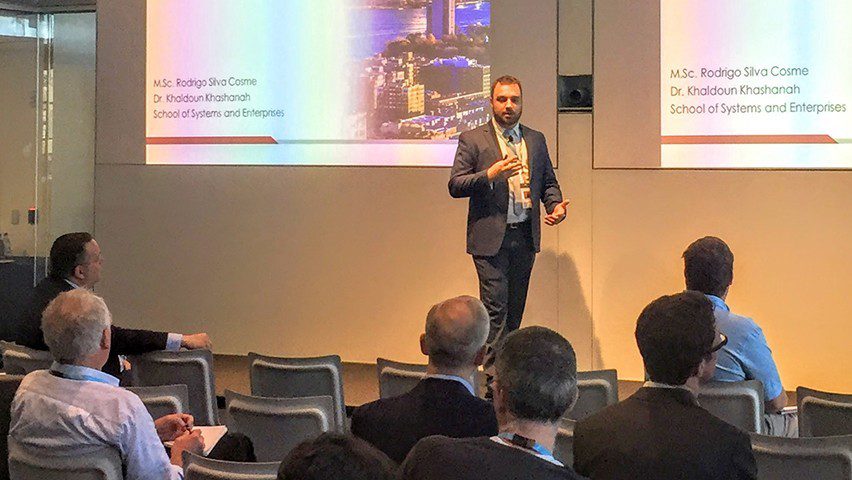
Rodrigo Silva Cosme delivers his thesis at a recent Bloomberg conference at Stevens/Photo via Stevens.
The São Paulo-based ZeroBeta is a unicorn of sorts in the Brazilian market, which “lacks the liquidity that allows for more diversified risk in investment strategies.” The startup leverages algorithmic trading and portfolio optimization techniques to “build smarter strategies for trading.
Cosme continues, saying, “Instead of working for [hedge fund managers], we trade with them—we develop the strategies for the accounts, we make the trading decisions, and they do the commercial side of the business, getting customers and raising capital.”
Cosme attributes ZeroBeta’s success largely to the first-hand exposure he received at Stevens to the myriad ways that finance and technology can intersect. “What I do at my job, every day, is what I learned at Stevens — from trading option spreads, to coding through C++ design patterns, to portfolio rebalancing. If you’re not able to find the answers with the kind of resources Stevens has, you can’t find them anywhere.”
MIT Sloan Executive Startup on How To Sell Themselves
Brian Eastwood from the MIT Sloan School of Management recently discussed how TechEmergence founder Dan Faggella metabolized important lessons contained within the Negotiation for Executives program to sell his first startup, the e-commerce platform, The Science of Skill.
MBA Startup: Cotopaxi’s “Gear for Good”
With the motto “Gear for Good”, Cotopaxi, a startup founded by two Wharton School alums, is changing the game for philanthropy in business. In addition to their direct-to-consumer brand of outdoor gear, the company seeks to change lives through direct partnerships with charities, allowing customers to see the true impact of their contribution.
5 San Diego Startups to Watch in 2016
There’s no doubt that San Diego is a great place to be if you’re a startup. It’s surrounded by excellent universities like USD and SDSU and bustling business. A recent success story was GoFundMe, which had a $600 million price tag when it went up for sale. But what are the new startups taking over San Diego? Continue reading…
McDonough Hosting Student Startups in Summer Incubator
The Startup Hoyas Summer Launch Program at the McDonough School of Business will host 17 entrepreneurial ventures this summer in its startup incubator program. This special summer program is designed specifically for current students and recent graduates who want to launch a new venture.
The program’s various benefits include: dedicated support from Georgetown faculty, mentors, and other experienced entrepreneurs; work space in the business school’s Rafik B. Hariri Building on the Georgetown campus; introductions to local investors and entrepreneurs, including access to the 1776 startup incubator; invitations to exclusive networking events; and the opportunity to present their ideas to the DC entrepreneurial community. Continue reading…
emlyon: From International MBA To Entrepreneurship: How I Launched My Own Company
Sponsored Content
originally published on em-lyon.com and written by BusinessBecause
Whether you want to be your own boss, or you have a great idea for a startup, becoming an entrepreneur is a popular career path for business school grads.
Entrepreneurship is a popular post-business school career goal and a sought-after part of the MBA curriculum. In 2023, the Graduate Management Admission Council (GMAC) Prospective Students Survey found that almost half of business school applicants felt entrepreneurship and innovation was a curricula essential.
For Haobo Jiang, his International MBA from emlyon business school not only fueled his passion for entrepreneurship but also served as the launching pad for his own successful business venture.
We caught up with Haobo to find out how his International MBA helped him get there.
Discovering MBA entrepreneurship
After 13 years working across various sectors including IT engineering, finance, and supply chain management at appliance company Groupe SEB, Haobo decided it was time for a change.
“I had a general vision of the business world, but I lacked an understanding of core business elements”, he explains. “I realized it would be a good thing to have an MBA to complete that piece of the puzzle.”
With emlyon, located across the street from his place of work, Haobo got the perfect opportunity to find that missing piece of his puzzle.
Despite having no prior plans to launch a startup, as soon as Haobo joined emlyon he quickly became interested in MBA entrepreneurship. The small class sizes gave him the ability to connect with his cohort and access personal support that developed his interest in the area.
“Our team took the “entrepreneurship” course quite seriously, and we had a great teacher who inspired a lot of ideas. That was the start of everything.”
Gaining experience in MBA entrepreneurship
The emlyon International MBA prioritizes innovative thinking and places a strong emphasis on entrepreneurship.
One of the MBA classes Haobo took, named Fundamentals of New Ventures, is a dynamic and involved course, which works with students to develop their ideas from the conception of a problem to pitching a fully-fledged idea.
A freelance professor, Benjamin-Samuel Ewenczyk, teaches this class and brings his own experience as a successful entrepreneurship. Ben founded 4 Hour Startup, which creates, teaches, and helps implement resources about lean startup methodology and lean prototyping.
He also launched a vintage clothes brand with a past student, so he had many business lessons to impart to budding emlyon MBA entrepreneurs. His class teaches students how to establish small, achievable ideas, then workshop the concepts and, finally, pitch a complete idea.
“The class is a small accelerator. The idea is to teach the students about the fundamentals and push them to work on what’s important at that stage”, Ben says.
He adds that the key is for students to discover the most important part of a business idea.
“At the end of the day, what you want is to do something that’s useful, and that’s solving a problem for your users.” Throughout Haobo’s time at emlyon, especially on his entrepreneurship course, collaboration with his fellow students helped him develop his entrepreneurial mindset and skills.
“At first, we didn’t realize we were making mistakes. And then when we shared the results, not only with the teacher, but also with other groups, you realize that there are better ways of doing things”, he says.
Launching a business after an MBA
At the end of the semester, many of Ben’s students have strong ideas that morph into viable solutions.
Haobo’s initial business idea came about from thinking about ways to teach Chinese in French schools. He went through various versions and mistakes before the idea became a solid foundation for a startup.
“That project evolved and matured a lot. Its origin was a very different version.”
Haobo describes the thorough process he went through to find the right version of his idea.
“I submitted the proposal to my colleagues, to explore how things are going in the French education system. Then step by step, we met people who are working in the field, such as educational officials, parents, and students“.
“Somehow we got to a conclusion about how we can contribute to make things better”, he explains.
This conclusion formed the basis of his business, Rivière Yuan EdTech. Haobo realized that teachers had too many balls to juggle, including class preparation, dedicated time with students, and reporting to superiors and parents. He proposed an end-to-end process that invested in generative AI, helping students prepare more efficiently, more readily interact with the students during class, and transform preparation into exercises.
“Finally, since everything is tracked with the platform we’ve created, we give teachers some really easy to use models for the basic reporting purpose.” Haobo still feels supported by the emlyon International MBA through the network he cultivated there and the support he received.
“You get very experienced professionals—not only professors but entrepreneurs themselves—who spend some time with you, who can listen and help you succeed as an MBA entrepreneur”, he concludes.
This article was written by Laura Wise on November 27 for Business Because sponsored by emlyon business school
Discover more about the International MBA programs
emlyon - Learn More International MBA
Interested in the International MBA? Fill out this form and we will connect you with emlyon!
McMaster DeGroote Offers New Minor, and More – Toronto News
This week, Canadian business school have done their share to nurture innovative thinking in students and the broader community. We’ve laid out some of the high points below.
The Startup That Makes Globetrotting More Affordable– Communitech News
Rob Evans, graduate of Wilfrid Laurier University, is CEO and founder of Backpacker College, a startup that connects travelers with affordable places to stay (generally in university housing). Backpacker College allows universities to sell their unused beds during the summer, when students are on break. Through the app or website, travelers can access dorms at upwards of 115 universities, Laurier included. Speaking with Communitech News, Evans says:
“Now you don’t have to spend half an hour online judging how creepy your host might be, or what the best deal is on Google. We’ve already curated a set of great options that are affordable, we’ve ruled out the high-end and the low-end stuff and provided that mid-market that’s safe and affordable for families, sports teams, young travelers, retirees, as well as small groups and student accommodation.”
You can read more about the startup here.
New Minor In Innovation Gives Students A Head Start on Becoming Successful Entrepreneurs – DeGroote News
This fall, McMaster University’s DeGroote School of Business and Faculty of Engineering will partner with McMaster’s startup incubator, The Forge, to offer a minor in innovation to students interested in becoming entrepreneurs. The minor is meant to teach students to turn their own ideas into businesses, as well as how to think creatively within an organization.
On news of the new minor, Sue McCracken, Associate Dean at DeGroote School of Business, says, “The future of work is changing, and many of our students will be starting their own businesses within their own innovative ideas. We need to give these students the entrepreneurial skills and knowledge to take the right steps and risks to develop their ideas and build successful businesses.”
The DeGroote minor is open to all McMaster students. Beginning in September, students will be able to take The World of Entrepreneurship, which consists of case studies and prominent guest lecturers, and Lean Startup, which will teach skills like establishing a business model and testing business ideas with customers and stakeholders. Additional courses such as Founders Startup and From Founder to CEO will become available over the next three years.
You can find out more about the new DeGroote minor here.
Lessons in Leadership from MBA Leadership Day – News@Ivey
In late July, the 2018 MBA Leadership Day was held at Western University Canada’s Ivey Business School. The day kicked off with a “Learning to Become Better Leaders” panel, featuring three Ivey alumni. The day concluded with a speech from Deepak Chopra, former President and CEO of Canada Post.
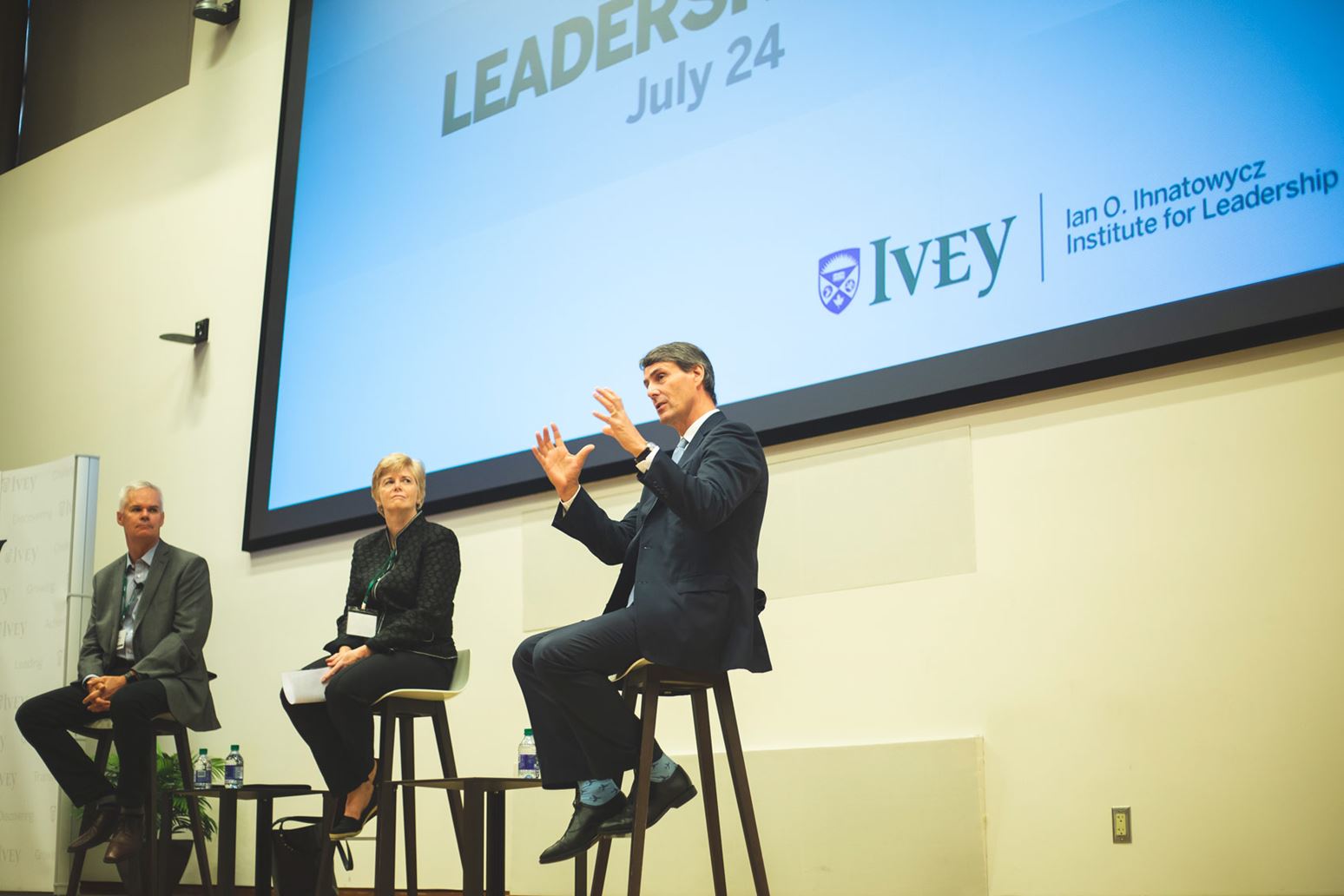
(Left to right) Pat Horgan, Barbara Stymiest, and Jon Hantho, attending this year’s MBA Leadership Day at the Ivey Business School / Photo via ivey.uwo.ca
The panelists offered important insights for the budding MBA’s. The panelists talked about the value of building a solid team, taking breaks, being humble, creating a strategy, and maintaining a big-picture perspective.
You can learn more about the key advice given to those in attendance at the MBA Leadership Day here.
Northwestern Investing in Green Companies, and More – Chicago News
Let’s explore some of the most interesting stories that have emerged from Chicago business schools this week.
The Case for Investing in Green Companies – Kellogg Insight
Northwestern University Kellogg School of Management professor of finance Ravi Jagannathan recently co-authored a new paper, which found that the more companies adopted greener practices, as defined by environmental, social, and governance (ESG) criteria, the more adaptable they are to changes in environmental regulations and the higher likelihood their share prices could increase.
Jagannathan and his co-authors stressed the importance of environmental risk, “particularly in the age of social media.”
He adds, “Today’s consumers can communicate and mobilize much faster—for instance, to shame a company for its unsustainable practices. Social media has made it easy to identify violators. If you invest in companies with shady environmental practices, you may be caught by surprise.”
He also adds, “Companies that pollute more now will be adversely affected by more stringent environmental laws coming into play and by alternative technologies spurred by environmental concerns.”
“What is standing in the way of coal is not regulation. You need to worry about alternative technologies catching up in response to consumers’ concerns.”
Jagannathan advises companies to “prepare for ESG-related changes [or they] will lose out in the long run.”
Read more about Jagannathan and his team’s research here.
Is There an Expert in the House? – Chicago Booth News
Three University of Chicago Booth School of Business entrepreneurs recently participated in a lunchtime panel, “The Cross-Disciplinary Formula for a Successful Venture,” held at the Harper Center in Hyde Park as part of the Polsky Center for Entrepreneurship and Innovation’s Innovation Fest.
The panelists discussed the impact that Booth community resources had on their startups and use the talk as an opportunity to offer advice to aspiring entrepreneurs on financing, product development, marketing, and personal growth.
ExplORer Surgical CEO and co-founder Jennifer Fried, MBA ’15 whose startup functions as a “a new digital playbook for operating personnel,” wrote about the “many cross disciplinary programs [it] took advantage of,” including the Polsky Center and the UChicago Startup Investment program.
Ascent Technologies co-founder Brian Clark, MBA ’17, whose firm “helps companies build and manage regulation compliance programs,” characterized this “sense of collectivism and community, [which] allows new ventures to thrive and grow.”
Tovala co-founder David Rabie, MBA, ’15, whose food technology company “pairs a steam-based oven with a meal-kit subscription service,” unpacked the challenges of bringing a new product to market.
“We’re trying to fundamentally change the way people think about eating at home. We have customers as young as 20 and as old as 85, but our real target is young families. It’s a massive market and we’re still trying to figure out the best way to reach these customers. We haven’t cracked that nut yet.”
Glean more insights from Chicago Booth entrepreneurs here.
Business and the Cycle of Nature – Quinlan School of Business Blog
Loyola Quinlan professor of sustainable business management Nancy E. Landrum, Ph.D., recently wrote an article for the Quinlan blog that “outlines how businesses can learn from nature’s 3.8 billion years of survival.”
She writes:
“Businesses generally use resources in a more linear fashion: we take resources from nature—water, plants, animals, minerals—and we transform them into products to sell. The products are then used and discarded. This has led to a depletion of resources and an abundance of waste.”
“But it can be quite simple if approached from the lessons of the cycles of nature: renewable, without waste, and conducive to life. If every company’s actions followed these simple guidelines learned from nature’s 3.8 billion years of survival, then it becomes clear that the company is creating conditions for its own survival.”
Read Dr. Landrum’s entire article here.
Finding the Best Real Estate MBAs in Los Angeles
Over the past few years, MBA programs and courses in real estate have seen continued growth, as both interest and need have become undeniable throughout the country. With property values and real estate often having a tremendous impact on the overall economic health of the nation, educating and placing top talent in this sector can be vital. But how can you turn a valuable MBA into a lucrative career in Los Angeles real estate?
Although a business focus on real estate is nothing new, the idea of MBAs concentrating in the industry as part of their degree has been getting increasingly more popular. It is somewhat difficult to find MBA programs that offer specializations in the field, even though 2017 saw more than $5 billion invested into real estate technology—a massive increase since the Great Recession. Startups like Airbnb and WeWork area also changing the way the real estate industry overlaps with entrepreneurship and technology, making it even more important for a workforce of talented individuals helping to guide the industry going forward.
Los Angeles, long at the center of discussions about urban development and city planning, features some of the country’s most vital real estate business program. Take a look at the three of the best Los Angeles real estate MBA programs below.
Marshall School of Business – USC
USC’s Marshall School of Business allows students in the full-time MBA program specialize their degree in real estate through electives that focus on topics like investment, finance, valuation, law, development, and the economics of real estate markets. This degree will prepare students for a variety of careers in the Los Angeles real estate field, pairing a focus on the unique aspects of the real estate field with the acknowledgement that success in the real estate field relies still relies on fundamentals like management, marketing, strategic planning, and economics.
The USC MBA in real estate is unique in the student’s ability to tailor the curriculum to their own career and educational needs, acknowledging the wide variety of roles within Los Angeles real estate, such as investment and asset management, consulting, valuation, asset management, and more.
Below are just a few Graduate Real Estate courses offered for MBA students at Marshall:
- Mortgage-Backed Securities and Markets. This course, which includes lectures, assignments and a project, looks at residential and commercial mortgages as well as mortgage-backed securities and markets.
- Urban Land Use-Feasibility Studies. This course consists of a team field study analysis of a prospective development site. Students will work together with a client to address issues like design, entity choice, deal structure, land use, economic analysis, and allows teams to interact with industry professionals throughout the process of developing their proposals.
- Real Estate Finance and Investment. This course consists of both cases and lectures, as well as assignments and exams to evaluate student’s understanding of valuation, projects, financing, and investment analysis. Students will also learn to use ARGUS 7.0, one of the top real estate investment software packages used throughout the industry.
Anderson School of Management – UCLA
The real estate MBA focus at UCLA’s Anderson School of Management has consistently been named among the best real estate programs in the country, let alone Los Angeles. The real estate concentration at Anderson trains students to join the industry through a strong education in real estate financing, investing, and entrepreneurial development. The concentration is integrated into the school’s overall MBA program, with the option for many real estate-centered electives, providing both theoretical and practical study in the most important aspects of the industry.
YOU MAY ALSO LIKE: The Top 5 Schools for an MBA in Real Estate
The Anderson School of Management also recognizes that real estate is not just a matter of business, and encourages MBA students to seek classes in other departments at UCLA, including public policy, urban planning, architecture, engineering, taxation, and law.
Below are some popular electives available to Real Estate MBA students at Anderson:
- Urban Real Estate Financing and Investment. This course helps students to bridge the gap between theory and practice in real estate finance and investment, training students to use finance and economics to uncover insights about real estate markets and investments.
- Entrepreneurial Real Estate Development. This course looks at real estate through the lens of entrepreneurship, helping students identify market opportunity, product definition, and conceptual feasibility through work in an entrepreneurial environment.
- Public Policy Clinic: Land Use, the Environment and Local Government. Acknowledging the interdisciplinary nature of this field, this course will provide students with a solid education in the complicated connections between land use control, state and local government law, and environmental quality
The Paul Merage School of Business – University of California, Irvine
At the Merage School of Business‘ Center for Real Estate, students can earn an MBA Certificate in Real Estate and Urban Development, with a curriculum just as dynamic and diverse as the marketplace itself. The MBA certificate presents students with a holistic approach to real estate, using lessons from past trends and cycles within the industry to help students prepare for a career in this often volatile industry.
Students who have at least two years of study in a Merage MBA program are eligible to pursue this certificate after successful completion of certain prerequisites in real estate. After completing these courses, students can choose from a number of electives connected to the certificate, such as:
- Real Estate Capital Markets
- The Real Estate Development Process
- International Real Estate
- Applied Real Estate Security Analysis and Portfolio Management
- Practicum in Mixed-Use Community Development
Boston News: Northeastern Explores Trump Tweets, MIT Offers FinTech Advice and More
Let’s explore some of the most interesting stories that have emerged from Boston metro business schools this week.
Can A Trump Tweet Dramatically Sway A Company’s Value? – Northeastern’s D’Amore-McKim Blog
Will Clark, DMSB ’17, along with Northeastern University D’Amore-McKim School of Business finance professors David Myers and Jeffery Born, sought to understand the impact that President Trump’s tweets—which often directly address publicly traded companies like Ford, Toyota, Walmart, GM, and Boeing—had on their stock market value.
“Past presidents communicated through the media. This was the first time that a president was communicating directly with the public—with investors—about companies. We really weren’t sure what to expect from the data,” says Clark, who is now a credit analyst with Morgan Stanley.
The trio’s research found that Trump’s tweets, in fact, did have some impact on companies, often increasing trade volume within the first few hours and days after he references them on the social media platform. The research was revealed in the academic journal Algorithmic Finance.
“The team found that Trump’s tweets dramatically increased trading volume for the companies’ stocks in the first few days following a tweet. They also found that positive (or negative) tweets about companies increased (or decreased) the firms’ stock prices by a modest amount—just 1 percent. But the changes were only temporary: Within a few days, the firms’ trading volumes and stock prices returned to pre-tweet levels.”
The lasting effect, however, was found to be longing. The trio notes that the most active traders, which they refer to as “noise traders,” were very reactive to Trump’s words, with trading tapering off after only a few days.

“They’re regular people and under-informed investors who want to get in and out and make a buck without thinking too long and hard about it,” Born notes about the financial impact of Trump tweets.
You can read more about the financial research on the Trump tweets from D’Amore-McKim here.
3 Lessons To Keep In Mind When Starting A FinTech Venture – MIT Sloan Newsroom
MIT Sloan School of Management MBA alum Sophia Lin, ’12, and her partner Andrew Kelley of the FinTech startup Keel, which connects “rookie investors with more seasoned ones,” shares some hard-won lessons in an op-ed for the Sloan blog. First of all: beware of hidden costs specific to FinTech. “
“Starting costs are higher than other industries because of data, infrastructure, and security requirements,” Lin said. “Data is expensive, which stops a lot of early stage startups from entering this field. But you need data to build your product.”
Read all of Lin’s words of wisdom here.
More CEOs Have Begun To Take Social Responsibility Seriously – HBR
CEOs from Facebook’s Mark Zuckerberg to Blackrock’s Larry Fink have begun to take very public stands to address the long-term impacts their products have had and continue to have on communities and the environment.
“We are witnessing a big, transitional moment—akin to the transition from analog to digital, or the realization that globalization is a really big deal. Companies are beginning to realize that paying attention to the longer term, to the perceptions of their company, and to the social consequences of their products is good business.”
Harvard Business School John and Natty McArthur University Professor Rebecca M. Henderson also explains that there are distinct differences between the size of a company, which often contrasts with the social goals of the company. The larger the company, the more long-term the outlook, she explains. Unlike small companies, larger firms worry about quarter-to-quarter results less.
“Big firms can also internalize certain externalities. An externality is a cost from a transaction that doesn’t fall on the buyer or the seller. If I pollute the air to make a product I sell to you, the cost of that pollution is spread out across society, and isn’t incorporated in the price I charge you for the product. Externalities pose problems for markets, since neither buyer nor seller have any incentive to deal with the costs. But sometimes, for really large firms, things work differently.”
The unfortunate causality, she notes, is that we are often reliant on the largest companies to take the initiative for causes that may be considered part of the global good. If some companies among the Fortune 500 elect to, say, go carbon neutral within the next decade, that can have a profound impact on other competing companies. And if those initiatives are not as profitable, there is an even greater risk of other companies being reluctant to attempt similar efforts.
Read more about the growing CSR trend among CEOs here.
Real Humans of the NYU Stern MBA Class of 2019
Clear Admit recently profiled many of the standout students from the NYU Stern MBA Class of 2019, which you can read below.
New York University’s Stern School of Business got the party started this summer as the first leading business school to share a profile for its incoming Class of 2019. That profile, published in late July, revealed a 4 percent uptick in application volume over the prior year. At the same time, the school admitted significantly fewer students—822 this year as compared to 871 last year—which means that those who got in did so against greater odds.

This increased selectivity may have contributed to the rising GMAT scores among those who got the nod. Both average and median GMAT scores increased year over year. The average GMAT score jumped six points, from 710 to 714. The median score increased even more significantly, from 710 to 720. Average GPA, though, slipped slightly, from 3.51 to 3.48.
As the school’s admissions process grew more selective, the enrolled class grew more diverse. The incoming class is 38 percent female, up from 35 percent the prior year. International students also increased to represent 37 percent of the Class of 2019, up from 35 percent in the Class of 2018.
In terms of the work experience they bring with them, more members of the Class of 2019 come from the financial services industry (29 percent) than any other. Another 12 percent of the class came from consulting. Students with government/non-profit, tech, and military backgrounds followed, at 7 percent each.
While some of these statistics hint at both the diversity and the high caliber of the incoming class, nothing brings that to life more than a look at some of the real students who enrolled. We spoke with five of them—drawn from Massachusetts, Texas, Michigan, India, and Lebanon respectively—to learn more about why they chose Stern, how they hope the Stern MBA will help them transform their careers, what advice they would offer to applicants navigating the admissions process right now, and more.
Perhaps not surprising, NYU Stern’s New York City location factored highly into the decision-making process for many of the students we asked. But so too did its community—including how approachable and friendly current students were to prospective students and the school-wide emphasis on IQ + EQ (emotional quotient)—and its curriculum, which has a strong core but also gives students the opportunity to explore electives early on and offers specializations in things like luxury marketing and technology. The reach of its alumni base was also a factor cited by several of the students we spoke with.
Read on to learn more about some standout members of the NYU Stern MBA Class of 2019.
D’Amore-McKim Study Abroad Explores Israel As Innovation Hub
The D’Amore-McKim School of Business at Northeastern University unveiled a new study abroad pilot program that hosted five MBA students on a two-week guided tour of Israel’s past, present, and future this summer. The new International New Venture program, a joint venture between D’Amore-McKim and Ben Gurion University of the Negev, combines “historic and cultural experiences with big business and young start-up visits.”




